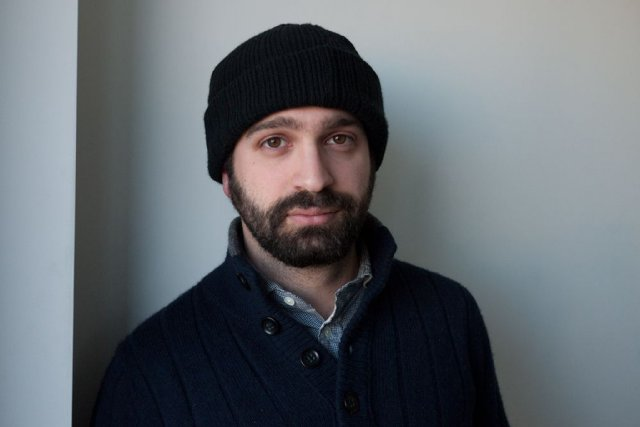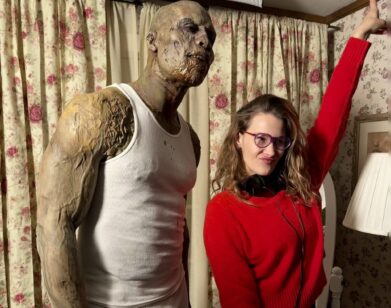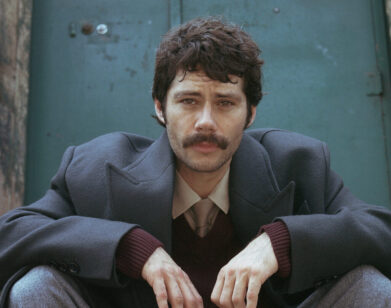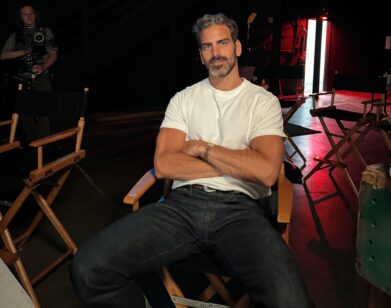Antonio Campos and the Borderline Personality

ABOVE: ANTONIO CAMPOS
The boys of production collective Borderline Films—Antonio Campos, Sean Durkin, and Josh Mond—have been doing pretty well for themselves. Their first feature, the Campos-helmed Afterschool, premiered at Cannes in 2008; in the wake of Durkin’s Martha Marcy May Marlene, they’ve propelled lead actress Elizabeth Olsen to stardom and signed a two-year first-look deal with Fox Searchlight. Yet their latest offering, Campos’ Simon Killer, was picked up not by any major studio’s indie distribution shingle but rather by the vaunted IFC Films—perhaps suggesting that Borderline’s true home will always be within the ultra-indie world. After all, Simon Killer, a dark quasi-thriller about a supposedly-sane college grad named Simon (Brady Corbet, who also had a supporting role in Martha Marcy) who has moved to Paris after a bad breakup, is hardly your standard commercial indie.
At Sundance we sat down with Campos for a moment to discuss Simon, Simenon, and Borderline’s “stable of actors.”
KEELY WEISS: I felt like Simon Killer was a spiritual successor in some ways to Afterschool. In fact, I read a review that said watching Simon Killer felt like watching the protagonist of Afterschool grown up.
ANTONIO CAMPOS: There’s definitely a part of me that felt like this was an exploration of a similar kind of character. I think there were definitely things that I wanted to continue. But Robert was a more likable character in a way, and I think that Robert’s trajectory is probably different than Simon’s. I think he comes from the same ilk; I sometimes thought that he would have gone to the same school in some way, like he was there but he was in a different class.
WEISS: Maybe in the grade of the girls who died.
CAMPOS: You know, the woman who played his mother in this is the woman who played the girls’ mother in Afterschool, so there is that link.
WEISS: You’ve worked with Brady Corbet before, too. Have you been lucky to work continually with the same friends, or have you made a concerted effort?
CAMPOS: We like to work with the same people over and over again. That said, we like to find new people that we want to work with, so it’s always a process. I always admire directors who had a stable of actors—going back to Preston Sturges, even if it was only in the supporting roles, he would go back to the same actors he loved. And when you find a good actor, they’re versatile and should be able to do anything. Most of the time we conceive the roles for our friends—we conceived the role of Simon for Brady.
WEISS: So the opening monologue of the film ends with the line, “Whatever, she’s a whore,” and the rest of the film is sort of an exploration of what that means, which I thought was really interesting.
CAMPOS: Yeah, I really wanted to open it up with a monologue that sets the stage for everything that’s gonna happen, and everything he describes in that five-minute dialogue of how things ended badly in the past is basically how they end badly then. I think it really brings into question what it is that this boy or man is actually looking for.
WEISS: There are definitely hints in the movie that this is a cycle for him, as opposed to a one-off incident. I actually wondered by the end of the film whether something similar had happened with his ex, Michelle.
CAMPOS: Yeah, it’s definitely up for interpretation. That’s kind of the game we wanted to play; we do want this to feel like there’s a mystery about what he’s left and what he’s coming back to. I think it’s clear, though, that if he became violent with Michelle, it was only to a certain extent, and now the violence has escalated.
WEISS: That’s another pattern among Borderline’s films—a kind of ambiguity about the circumstances. You see it through the main character’s eyes, as opposed to objectively.
CAMPOS: Yeah, I’d say all three films are very much from a specific perspective. You have moments where you get out of that world, out of the character’s head, but the film, for the most part, is a reflection of how this character sees the world and is feeling.
WEISS: When did you start developing Simon Killer?
CAMPOS: Sometime in the spring, I had the initial idea, and I started sharing it with people around the summer of 2010. I mean, it was very quick from actually putting something on the page to getting to Paris.
WEISS: What was the inspiration for the film? Where did you get the concept?
CAMPOS: It came from reading a lot of this author, Georges Simenon.
WEISS: Oh, really, like the Maigret books?
CAMPOS: You know Simenon? He’s written 500 books. What a crazy, crazy prolific guy. I never read the Maigret novels until after I started reading the hard novels. I’ve read The Strangled Stripper and I’ve read Bar in the Sand and some other one, I think. I found that I really like the Paris underworld and the Paris of the period, and with The Strangled Stripper I’d lived in that area, so I knew what streets they were talking about, which was really exciting. I have that book on my wall. But that was the world that he was in that I had lived nearby, so I was interested in it as well.
WEISS: Study abroad in college?
CAMPOS: No, I did this thing called the Cannes Residence, and that’s where I wrote Afterschool. The Cannes residence was in Paris, right on the border of Pigalle. But I found I was really interested in this universe and the characters that he deals with in the hard novels, which are really complicated, opaque male central figures. That was the jumping-off point. Even the name Simon is a derivation of Simenon, so that was the initial inspiration. Then, when we discovered the Van Der Sloot thing, things really kind of came together—that was the initial part of it. Then there’s the idea that everyone has gone through a breakup, everyone has gone through an uncertainty or malaise about what they’re doing.
WEISS: Yeah, but most people don’t take it to Simon’s extremes.
CAMPOS: But that’s the point: you start off at a place that is familiar. We’ve all made stupid choices or behaved irrationally or compromised our own principles, but we just go so far. Simon’s progression is very bit-by-bit-by-bit, so if you just keep going bit-by-bit-by-bit too far, where could you end up? That’s what scares me: not necessarily the guy who’s a psycho from the get-go, but the guy who has something in him that he’s willing to explore or to test.
SIMON KILLER, WHICH RECENTLY SCREENED AT SUNDANCE, HAS BEEN PICKED UP FOR DISTRIBUTION BY IFC FILMS.






